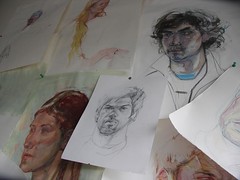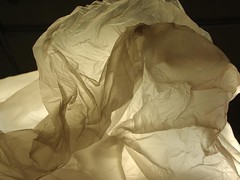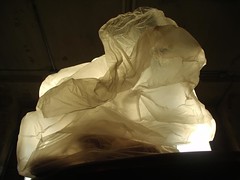(Or…. Disillusion, False Virtue and Dented Ideals)
There is no small difference between an idealist and a believer; they are vastly different.
This may not be obvious, but what IS clear is that all identities and experiences are an alloy of difficulty and ease, joy and pain, the anticipated and the unexpected. Idealists don’t see this, though those who know better shout about it, wave flags of warning and generally do their best to publish the truest report to prepare others aiming to be, oh, say an artist, a father, a teacher, a spouse. Instead of heeding and assimilating the facts offered by those who know, idealists wade-in, bewitched by the dazzle of the artistic myth or marital bliss or some such other fuzzyheaded half-Hollywood fantasy. And when the inevitable hammer of reality dents and bends those ideals into the shape tailored and appropriate to the particulars of circumstance, idealists feel as though their idol and motivation are desecrated by the touch of the actual and there is a crisis of faith that causes pause, perhaps even abandonment.
We want the world as we dream it should be, not as it is.
At this point the sense of outrage and bankruptcy feels somehow justified, as though no warnings were issued. But they were. The very fiber of existence is run through with threads of caution and realism. Every identity has both its obvious attractive qualities and it’s perhaps more hidden difficult ones, only discovered through experience. Even a child could tell you that.
Adults are always telling children that childhood is the best time in life… savor it, cherish it blah blah blah blah…. small wonder kids are convinced adults are crazy. Don’t they remember the curfews and chores, bullies, and groundings? Childhood certainly contains these tortures, but it is also pure bliss: afternoons of creek-wading and long games of twilight tag, weaving between lightning bugs under dusky oaks. Both are true. It is not as though this lesson is unavailable or tardy in the timeline of existence. It IS lovely to be a child, an artist, a wife, a gardener…but you also get some scabs and scratches in the actual job of being these things. How is it that this truth is both so obvious and unexpected, always a surprise when we actually experience it?
At such moments, two attitudes present themselves. Idealists can choose to become resolved believers, shoring-up hope with discipline, or go limp and become a cynic.
Many man-made ideas influence this choice, the strangest of which is the idea that ‘passion’ is thought to be a cardinal virtue… the absence or vacillation of which in any decision betrays a lack of genuine heart or feeling. At least that is what is thought … AND taught. Taught most often from pulpits. But common belief isn’t true simply because the majority agrees. Truth is not democratic. Never has been.
That the church has blindly adopted the notion that emotion is the index of sincerity and righteousness in thought and action is infuriating, dangerous and utterly un-biblical. This idea, at its root, is existential and speaks nothing to the truly Christian virtue of faithfulness, of the salutary power of limits.
If nothing else, the Bible is emphatic about the deception of the human heart…. Who can know it? Certainly not its owner…. Only, perhaps, its Lord. But that Lordship can be heeded or ignored and dramatically different consequences will follow. There is nothing wrong with making decisions with your head and requiring the heart’s obedience whether it is glad to comply or be in full rebellion to a chosen course. The heart feels and the mind assesses; God uses both and they must work in tandem. A ship needs both the map and the sail. Emotional winds are to be caught at the right angles, their power directed by the mapped information. Some winds are rejected outright; take no easterly wind if your course is west.
So, then, there is an call to discipline… lordship…a kind of faithfulness that determines to withstand all persuasions, including emotional mutiny, and move forward only on the chosen way. Obedience is the strongest evidence of love - or so the Bible bluntly says. And when we are commanded to love, all the resources of human determination are clustered together: ”Love the Lord with all your heart, mind, spirit and strength.” Love is too difficult to support with only one ingredient, so why make emotion chief among equals?
Grant feelings such power, and they become fickle tormenting gods… why submit to such despots? Choice is our one weapon against their tyranny. Small, stubborn choices are powerful to bring down empires, to break long bondage with the incremental force of persistence, and God promises His substantial reinforcement if we would but choose. Freewill is the thumbprint of the Divine; but it is a healthy thing to recall that humanity is a strange mixture of eternity and mud, stardust and dirt. We are free to use the better part - our sovereign will - to steer toward the true Light …. or toward our own unattainable will-o-wisp. Lord, teach me to number my days so that I may gain a heart of wisdom…. not mere feeling.
Human passion is a potent force; but who is Lord, your heart, or His Passion? His Passion was demonstrated in the staggering choice to die for the ungrateful; He allowed His whole life and death to be steered by love despite wrestling in the Garden with strong desire to do anything otherwise. Yet He persisted to the last breath and the greatest love was demonstrated in the most unbelievable obedience. Will we imitate His example, and allow the tension of love’s limits give shape and direction to our existence, or give our lives to the whims of emotional hedonism?
There are no doubt dreams and passion are powerful, ecstatic realities of human experience and life would be intolerable without them. But never enthrone them. Be suspicious because while giving gifts with one hand, unexamined dreams can rob with the other. They can steal this moment, and the next and the next and the next… like pennies one at a time. Distracted by dreams, reality, in all its commonplace glory goes unguarded. It is not our place to think over-much of the future, and if we do, it is wise to ask whom or what shapes our expectations. Most unspoken expectations could very well be false, in which case disillusion in itself is a shattering blessing. It is for our best when our illusions break because it is then we can be shaken from their spell in order to question the sorcerer and ultimately decide to let disappointment or determination shape your destiny.
It is a fact that things go wrong in life. Thank goodness it’s short; things are really messy down here. In truth, it is a blessing that there are troubles that do not leave us; we need Him because of them. Even given all that’s necessary for happiness we humans would create a flaw. Besides, how could we ever hope to even know what will makes for happiness? Circumstances certainly do not. There will be no final arrival, no static state of bliss and balanced contentment; anyone who says otherwise is lazy and wants God to coddle them, to carry them through this bewildering life as though they were helpless, hapless children. Those who talk overmuch about perfect destiny are suspect. With such theology there is no need to make decisions, to feel any real guilt or trepidation, instead we can shovel all such personal responsibility into the shadowy, romanticized abyss of ‘Divine Destiny’. For God’s sake, grow up… yes, for God’s sake and yours. Viewing life in such a way can smear God’s reputation with horrible evils; the torture of Chinese Christians is not Divine Destiny, it is wicked. God, however, promises to redeem our troubles. They may not be removed, but whom we choose to be in the midst of them can change everything. The prisoner who chooses hope is to be envied more then the crown of a despondent, cynical king
And that’s another thing. There is this unspoken concept that cynicism is somehow inherently truthful. It is not…. lazy, self-protective unbelief is what that is. Cynics guard themselves from disappointment by never trying; they do not risk, and so, stagnate in their self-made safety. Hope and determination are the only steering forces that shape identities, cynicism stalls motivation, robs the future, darkens the spirit, it is the opposite of hope. Cynical disillusion is not truthful, it is pernicious.
Perhaps it is better to take idealism in one hand and disillusioned cynicism in the other and mix them to form belief, which is neither foolhardy nor disparaging, but realistic, motivated by hope and fortified with determination. Under the influence of belief, perhaps then it will be possible to step through the door of decision armored by faith but light-footed with hope.
Faith, Hope and Love are an indivisible Trinity, no one aspect is possible without the others. Greatest of these is love… but Love must be Faithfully, repeatedly chosen under the influence of great Hope. Only then does childish idealism fall away and the true believer born.






